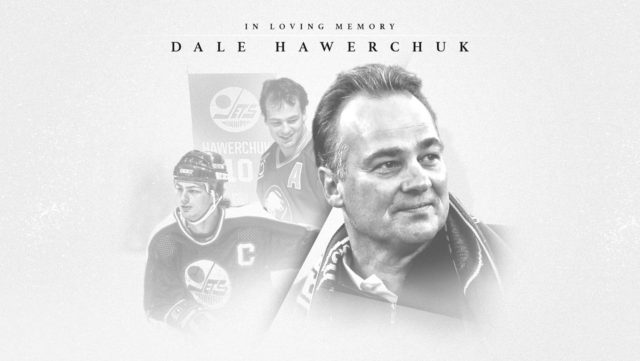By NHL.com —
Dale Hawerchuk, the leading scorer in the first iteration of the Winnipeg Jets and a member of the Hockey Hall of Fame, died at the age of 57 after he had stomach cancer, his son Eric announced over Twitter on Tuesday.
“Dale Hawerchuk put Winnipeg and the Jets on the map the day he arrived in our city in 1981, and his love for our community and remarkable Hall of Fame career will keep it here for many generations to come,” the Jets said in a statement. “Dale had a relationship with our fans unlike any other player in the history of our franchise. Whether at home or on the world stage, ‘Ducky’ was embraced by so many, so often because of his humility and the grace by which he always carried himself. Dale was quite simply one of the finest human beings we have ever known that also just happened to be a superstar.
“The Winnipeg Jets Hockey Club, our players, our alumni, and our fans will miss him dearly, and we will forever be inspired by his passion for the game, his commitment to his team, and his love for our community.”
[RELATED: Commissioner Gary Bettman statement on the death of Dale Hawerchuk]
Hawerchuk was honored with a moment of silence before Game 4 of the Eastern Conference First Round between the Philadelphia Flyers and Montreal Canadiens at Scotiabank Arena in Toronto, the hub city in the East, on Tuesday.
A forward who was a six-time 100-point scorer for the Jets and helped make them a consistent Stanley Cup Playoff team during the 1980s, Hawerchuk held the franchise career records for goals (379) and points (929) until Shane Doan, captain of the Arizona Coyotes and the last member of the original Jets still active in the NHL, surpassed them during the 2015-16 season. By then, the relocated franchise was concluding its 20th season in Arizona after moving from Winnipeg in 1996.
“The National Hockey League mourns the passing of Dale Hawerchuk, an instant and enduring star who captured the hearts of two hockey-loving cities, represented his country with class and distinction and is one of the most decorated players in our game’s history,” NHL Commissioner Gary Bettman said in a statement.

Hawerchuk was a star almost from the time he began playing competitive hockey at age 4. He played junior hockey with Cornwall of the Quebec Major Junior Hockey League and had 103 and 183 points in his two seasons, helping the Royals win the Memorial Cup each time.
The Jets took Hawerchuk with the No. 1 pick in the 1981 NHL Draft and he was an instant star, winning the Calder Trophy as the top rookie in the NHL after scoring 45 goals and 103 points in 1981-82 and becoming the first player to reach 100 points as an 18-year-old. The Jets improved by a then-NHL record 48 points from the previous season, finished second in the Norris Division and qualified for the playoffs for the first time.
“It was hard,” Hawerchuk said in 2018. “Training camp, even at training camp, I remember saying this was so fast and so quick and remember sleeping a lot because I was always exhausted and pushing yourself and playing against men every night and then you remember times where it clicked and you felt really good and then you’d hit a wall again and struggle for a week or two, and then second wind again. I was only 18 so my body, I wasn’t the biggest guy, but I slept a lot that first year, that’s for sure, but I wanted to sleep and be fresh and be ready and to create that consistency over an 80-game schedule back then.
“I knew I needed to be rested because … we flied commercial then as well. the travel was a lot more difficult than it is now with private jets. It was always about being prepared, rested and putting the work in when you could and trying to get stronger and quicker when you could.”
Hawerchuk reached the 100-point mark in six of his first seven seasons with Winnipeg. The only thing he couldn’t do was bring playoff success; the Jets got past the first round twice in his nine seasons in Winnipeg. Hawerchuk had more success internationally, helping Canada win the Canada Cup in 1987 and 1991. He won the face-off that led to Mario Lemieux’s winning goal in the 1987 tournament.

The Jets traded Hawerchuk to the Buffalo Sabres on June 16, 1990. He averaged 94 points in his first four seasons with the Sabres before injuries limited him to 16 points in 23 games during the lockout-shortened 1994-95 season. He signed with the St. Louis Blues on Sept. 8, 1995 but was traded to the Philadelphia Flyers on March 15, 1996.
Hawerchuk helped the Flyers advance to the Stanley Cup Final in 1997, the only time during his 16-year NHL career that his team got past the second round of the playoffs. He retired soon after Philadelphia was swept by the Detroit Red Wings because of a degenerative left hip. He finished with 1,409 points (518 goals, 891 assists) in 1,188 NHL games.
“I got fortunate, I played with him at the end,” Carolina Hurricanes coach Rod Brind’Amour said. “His last year was in Philadelphia when we played together on the same line. So playing against him, he was just a great player. I always, it’s funny, you play a game with a lot of teammates. You very rarely remember how they played. It’s always about what kind of people they were.

“He’s just a great person, can’t even remember any of the games. You just remember what kind of guy he was and actually for me, what stands out was I was a centerman, he was a centerman. He was a Hall of Fame centerman. We got on the same line and he’s like, ‘I’ll play left wing. You play center.’ It sounds like a stupid thing, but that’s a little thing that just stands out to me and tells you what kind of guy he was. Just we’re obviously thinking of him. He was just a great person.”
Hawerchuk was elected to the Hall of Fame in 2001, and his No. 10 was honored by the Coyotes on April 5, 2007.
Following his retirement, Hawerchuk raised show jumping horses before becoming coach of Barrie of the Ontario Hockey League. He remained with Barrie until taking a leave of absence for health reasons in September 2019.
“Hawerchuk was in the midst of a similarly successful post-playing career as a coach and director of hockey operations of Barrie of the OHL when he became ill and was taken from us far too soon,” Bettman said. “We send our condolences to his wife, Crystal, their three children, Ben, Eric and Alexis, and countless teammates and fans who were fortunate enough to see him play and call him a friend.”
NHL.com staff writer Mike G. Morreale and independent correspondent Wes Crosby contributed to this report.
Photos Courtesy: Hockey Hall of Fame







